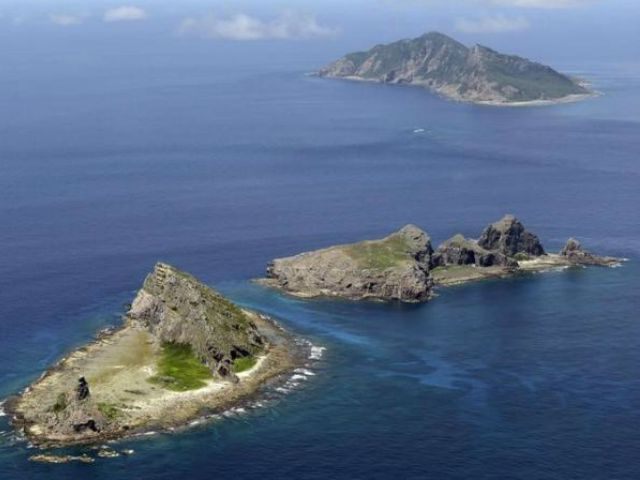Legislators in Japan’s Ruling Liberal Democratic Party (LDP) are urging Prime Minister Shinzo Abe to bring a case against China to an international tribunal to settle once and for all ownership over disputed islands in the East China Sea.
The push for outside arbitration comes in the form of a legislative resolution pressuring Abe to consider an international tribunal for resolving the issue, as China has breached a 2008 agreement not to interfere with the disputed Senkaku Islands in the sea. The Senkaku Islands are uninhabited, but located in an oil- and gas-rich area, where China has begun constructing exploration platforms. “Everyone has agreed that we should not shy away from taking the matter to an international arbitration court and starting preparation for that step should be considered,” LDP legislator Yoshiaki Harada said in a statement, suggesting that China had “shrugged off” Japanese protests to their presence in disputed territory.
The Chinese government has made extensive territorial claims in the waters surrounding the mainland in the past half decade. Beijing is currently facing a case in the Permanent Court of Arbitration at The Hague for its claims in the South China Sea, which its neighbors contest. Malaysia, Brunei, Taiwan, the Philippines, and Vietnam all claim territory in the South China Sea that China has begun expansive construction projects on; the Philippines filed the case at The Hague. The Chinese government has vowed to disregard any decision coming out of The Hague no matter the outcome.
In addition to the Philippines’s case, Indonesia — which does not make a claim in the South China Sea territory dispute, but fears China will expand its claims in the future — has threatened to bring China’s territorial claims to an international court.
Japan joins these nations in having organic support within its government for using international legal channels to stop Chinese expansionism. The move follows the publication of a defense white paper earlier this year that suggests that China may not only be seeking to develop natural resources near the Senkaku Islands, but may also use the exploration platforms it is constructing to establish surveillance stations in the region.
China attempted to completely usurp territorial authority from Japan in the East China Sea in 2013, when it unilaterally imposed an Air Defense Identification Zone (ADIZ) over the Senkaku Islands (which China calls the Diaoyu). Such a declaration would require all aircraft in the region to identify itself to and request permission from the Chinese government to travel there. The Japanese government declared the zone “unenforceable” and proceeded to disregard the declaration, with the government of the United States issuing a statement noting that America is bound by treaty to defend Japan if any of its aircraft come under attack. That ADIZ is still in place today and remains unenforced.
While Japan has worked to combat the Chinese presence in the East China Sea, it has grown into a significant actor in the multilateral South China Sea dispute, despite having no claims in the region. On Wednesday, Prime Minister Abe issued a joint statement expressing “serious concern over the recent situation in the South China Sea” with the President of East Timor. East Timor is a tiny nation in region that has not made any overlapping claims in Chinese disputed territory and has traditionally had friendly relations with China.
The Japanese Foreign Ministry also released a video last week titled, “The Rule of Law At Sea,” highlighting concerns surrounding Chinese developments in the Spratly and Paracel Islands. “While there are concerns in the international community about attempts to unilaterally change the status quo at sea, Japan has been providing seamless support, combining ODA (official development assistance), defense equipment cooperation and capacity-building to help improve sea protection capabilities while calling for strict adherence to the principles of the rule of law,” the video claims.
The Japanese Self-Defense Forces also recently sent a submarine to navigate the region near the Spratly Islands, infuriating China, and signed a defense deal with Manila that commits the government to sell military equipment to the Philippines. While the two governments have not yet agreed on what specific equipment they will trade for, Philippine officials are said to be especially interested in surveillance aircraft.
Asked of China’s bilateral relations with Japan on Wednesday, Chinese Premier Li Keqiang described them as “fragile,” though he appeared more optimistic than many Chinese officials typically are about the neighboring island nation. “There have been some signs of improvement in Sino-Japanese ties, but it’s not fully established yet… We believe that it is important to adhere to the consensus reached by the two sides on the issue of principle involving history, and it is important to match one’s words with concrete actions,”he said.

COMMENTS
Please let us know if you're having issues with commenting.